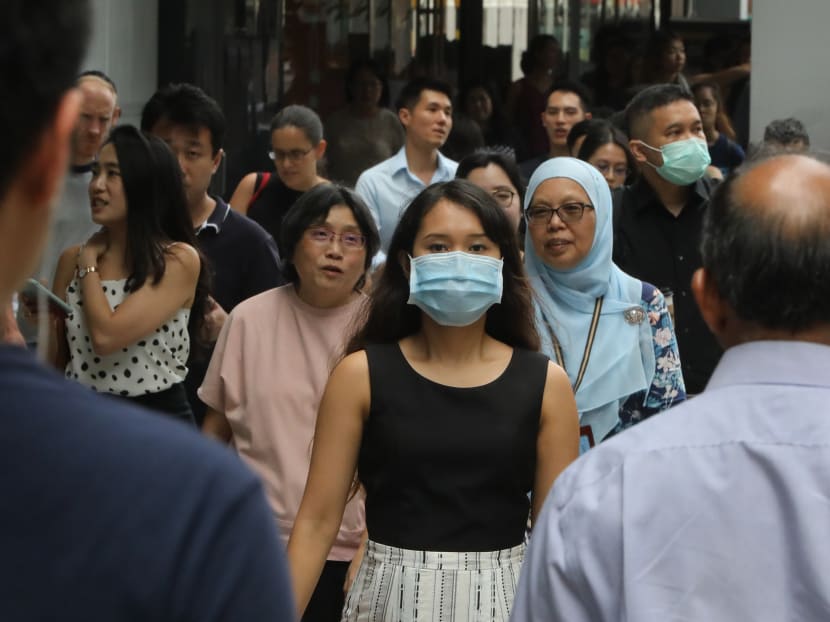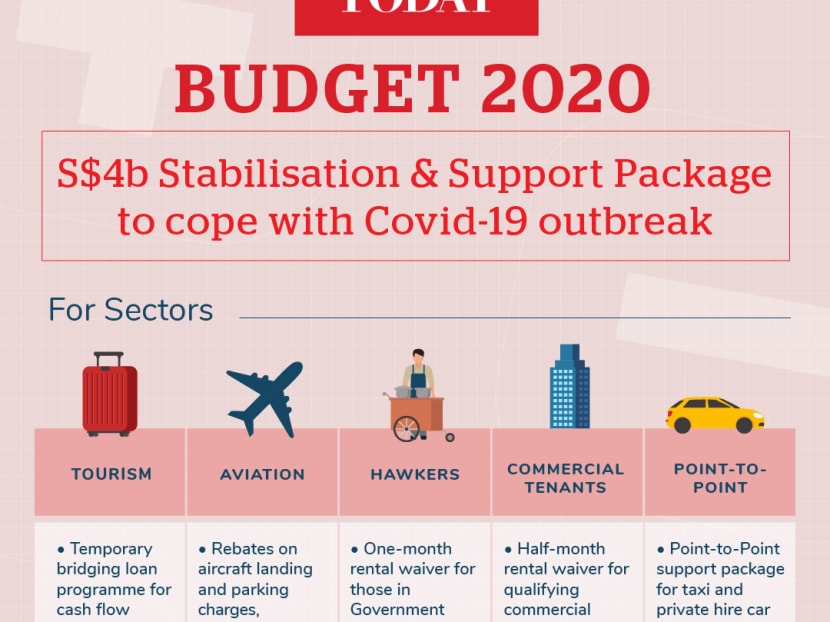Budget 2020: S$5.6 billion special packages to support firms, workers and households amid Covid-19 outbreak
SINGAPORE — Amid expectations of a substantial package to help Singapore cope with the Covid-19 outbreak, Deputy Prime Minister Heng Swee Keat unveiled during this year’s Budget statement not one, but two special packages totalling S$5.6 billion to help firms and workers, as well as households.

The special packages come on the back of lacklustre economic growth last year, the weakest since the 2008 global financial crisis.
SINGAPORE — Amid expectations of a substantial package to help Singapore cope with the Covid-19 outbreak, Deputy Prime Minister Heng Swee Keat unveiled during this year’s Budget statement not one, but two special packages totalling S$5.6 billion to help firms and workers, as well as households.
The packages dwarf the S$230 million package introduced during the Sars (severe acute respiratory syndrome) crisis in 2003, and significantly exceed analysts’ expectations.
They comprise a S$4 billion Stabilisation and Support Package which will “stabilise the economy and support our workers and enterprises”, as Mr Heng put it, and a S$1.6 billion Care and Support Package to help households with cost of living.
The special packages come on the back of lacklustre economic growth last year — 0.7 per cent, the weakest since the 2008 global financial crisis.
On Monday, the Ministry of Trade and Industry downgraded its economic growth forecast to between -0.5 per cent and 1.5 per cent, down from 0.5 per cent to 2.5 per cent.
In his Budget speech on Tuesday (Feb 18), Mr Heng, who is also Finance Minister, noted that Covid-19 hit Singapore “just as the global economy was beginning to recover”.
“The outbreak will certainly impact our economy,” said Mr Heng, adding that this is especially so since Singapore’s economy is now much more integrated with the economy of China, where the virus originated.
The Government is monitoring the situation and it is ready to do more if necessary to help Singaporeans cope with the economic impact, Mr Heng reiterated.
Comprising broad-based measures, the two packages will also feature targeted support, with the less well-off and industries more impacted by the outbreak getting more help.

BROAD-BASED HELP FOR FIRMS, WORKERS
JOBS SUPPORT SCHEME
Under the Stabilisation and Support Package, a S$1.3 billion Jobs Support Scheme will be rolled out to benefit all enterprises and their local employees which total more than 1.9 million people. The Government will pay for 8 per cent of the wages of these workers, up to a monthly cap of S$3,600 for three months, said Mr Heng.
This scheme will help businesses retain Singapore workers and will be given to employers by the end of July. The measures are directed toward Singaporean citizens and permanent residents, as well as both full-time and part-time hires.
ENHANCED WAGE CREDIT SCHEME
The Wage Credit Scheme currently co-funds wage increases for Singaporean employees earning a gross monthly wage of up to S$4,000.
The cap will be raised to S$5,000 for qualifying wage increases given in 2019 and 2020. The Government will also co-fund five percentage points more, raising the levels to 20 per cent for wage raises in 2019 and 15 per cent for those in 2020.
The enhancement will cost the Government another S$1.1 billion, benefitting 90,000 enterprises and more than 700,000 Singaporean employees, Mr Heng said.
OTHER INITIATIVES
A corporate income tax rebate at the rate of 25 per cent of tax payable, capped at S$15,000 per firm, will also help all tax-paying companies in Singapore. This will cost the Government S$400 million.
“We will also support tenants and lessees of government-managed properties,” said Mr Heng.
Tenants and lessees under the JTC Corporation, the Housing and Development Board (HDB), the Singapore Land Authority, the Singapore Tourism Board and the Sentosa Development Corporation will receive help with rent, including more flexible rental payments.
Firms can apply to the relevant agencies which will assess each request individually.
Several tax treatments under the corporate tax system will also be enhanced for one year, such as allowing a faster write-down of investments in plant and machinery, renovation, and refurbishment under the 2021 year of assessment.
“This will put more cash in the hands of our enterprises. For example, hotels can now take advantage of this lull period to carry out upgrading work, and be better prepared for the rebound,” said Mr Heng.
To help enterprises access working capital more easily, the working capital loan component under the Enterprise Financing Scheme will be boosted for one year, with the maximum loan quantum doubled to S$600,000.
The Government will also bear greater risks for these loans, with its share of risk upped to 80 per cent from the current range of 50 to 70 per cent.
“With the large part of the risk taken up by the Government, I trust that our financial institutions will do their part to support our viable SMEs (small- and medium-sized enterprises),” said Mr Heng.
TARGETED HELP FOR SECTORS DIRECTLY HIT BY OUTBREAK
Additional help will be given to sectors directly affected by the outbreak — tourism, aviation, food services and retail, as well as point-to-point transport sectors.
These sectors will be given help to retain and reskill workers. The funding period for reskilling workers through redeployment programmes under the Manpower Ministry’s Adapt and Grow initiative will be increased to a maximum of six months.
Said Mr Heng: “Together with the Jobs Support Scheme, we will support employers in these sectors to retain and train more than 330,000 local workers. These workers can make full use of the down time for training and upskilling to prepare for the recovery.”
For the tourism sector, a property tax rebate of 30 per cent will be granted this year to accommodation and function room components of licensed hotels and serviced apartments, as well as venues for Mice (meetings, incentives, conventions and exhibitions).
International cruise and regional ferry terminals will receive a 15 per cent property tax rebate, while integrated resorts will get a 10 per cent tax rebate.
A temporary bridging loan programme for the tourism sector will also be rolled out for a year, with a loan quantum of up to S$1 million and interest rates capped at 5 per cent. The Government will also bear 80 per cent of the risk of the loan.
The aviation sector will benefit from a range of measures, including a 15 per cent property tax rebate for Changi Airport, as well as rebates on aircraft landing and parking charges, assistance for ground handling agents and rental rebates for shops and cargo agents at Changi Airport.
A Transport Ministry spokesperson said that the impact of the Covid-19 outbreak on Singapore’s aviation industry has been significant, with more than 80 per cent of all scheduled flights between Singapore and mainland China cancelled.
“There are now fewer than 80 services per week, compared with over 400 prior to the outbreak. Passenger traffic has dropped,” said the spokesperson, who added that traffic to Singapore from other regions has also started to decline.
Food services and retail businesses will also receive rental waivers or rebates. Tenants at National Environment Agency-managed hawker centres and markets will get a full-month of rent waived, and other Government agencies such as HDB will provide a half-month rent waiver to their commercial tenants.
Those that operate out of private properties will also not be left out — landlords will be granted a 15 per cent property tax rebate for commercial properties that qualify.
“I strongly urge landlords to pass this on to their tenants by reducing rentals,” Mr Heng said.
For the point-to-point transport sector, which include taxi operators and private hire car firms, Mr Heng noted that the Transport Ministry had recently announced a support package for these businesses. Many firms in this sector have come forward to support the initiative by matching the Government’s contribution, he added.
Said Mr Heng: “This spirit of partnership is what we need to weather this challenging period together.”
More details of the various measures will be revealed in the upcoming debates into the respective ministries’ budgets.
Mr Heng added that he will elaborate on the S$1.6 billion Care and Support Package in the later part of his speech.
S$800M BOOST FOR FRONTLINE AGENCIES
Separately, apart from the two special packages, another S$800 million will be injected to support the frontline agencies dealing with the outbreak. The bulk of the amount will be channelled to the Ministry of Health.
“This is on top of the substantial resources already committed each year to public health,” said Mr Heng, who then thanked all frontline officers who have been working tirelessly to fight against the outbreak — prompting other members of the House to thump their armrests in support.
Paying tribute to the group, he said: “You exemplify the resilience and indomitable spirit of our people. But please take care of yourselves. I am confident that together, we will stay strong and get through these trying times.”








